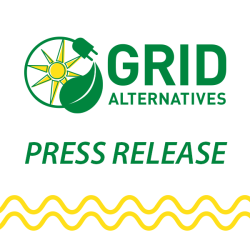For Immediate Release
Media contact: Maya Batres, GRID Alternatives, media@gridalternatives.org, 916-585-8542
Oakland, CA – GRID Alternatives is deeply disappointed in the initial guidance released by the Biden Administration regarding its implementation of the new Low-Income Communities Bonus Credit Program established by the Inflation Reduction Act (IRA). With little explanation, the Treasury Department rejected program design recommendations developed through intensive collaboration with clean energy industry, environmental nonprofit, affordable housing, and social, economic, and racial justice advocate leaders. The consequences of the initial guidance could threaten the viability of one of IRA’s core energy justice mechanisms and will exclude many of the highest-impact projects for building community wealth and resilience. We urge the Administration to reconsider.
As set forth in IRA, the Low-Income Communities Bonus Credit Program requires Treasury to establish a process to allocate up to 1.8 gigawatts of “environmental justice solar and wind capacity limitation” annually among qualifying projects, which can then receive a bonus tax credit on top of the baseline 30% Investment Tax Credit (ITC) after they are placed in service. The statute provides four ways projects can qualify, two location-based (eligible for 10% bonus) and two based on economic benefits for low-income households or affordable housing occupants (eligible for 20% bonus). The statute does not require that these qualification thresholds also be used as categories for capacity allocation, especially in light of the clear legislative preference for demonstrating actual economic benefits, and the far better approach of categorizing projects by project type, not credit type.
GRID Alternatives has worked with environmental justice communities to install renewable energy for 20 years. Based on our experience, GRID strongly recommended that Treasury establish an open, rolling application process that would be easily accessible to community-based organizations and local businesses. This kind of process is used by many state energy equity programs and would have been readily feasible to implement with existing scalable software. Treasury’s decision to have only one limited application window in the last half of 2023 is incompatible with real-world project timeframes, especially for the most beneficial rooftop and community solar and storage projects. It also disregards the need for confidence in incentives early in project development, which is especially crucial for the most equitable clean energy projects.
“As a result of the initial guidance released by the Treasury Department, far fewer households will benefit from the program,” said Andie Wyatt, Policy Director and Legal Counsel for GRID Alternatives. “In fact, very few households will see any benefit at all in 2023, despite the urgent need for energy bill savings and climate action. To add to this problem, the developers and projects that are able to apply for capacity for projects in the narrow window are, on average, likely to deliver lower economic benefits to the households that are served, regardless of any additional prioritization criteria. We strongly urge the Administration to reconsider.”
GRID hopes that Congress will lift the unjustified capacity cap that treats environmental justice as a uniquely scarce resource under the Tax Code as amended by the IRA. In the meantime, the Administration must work with stakeholders to alleviate the problems in the initial guidance, open the program as soon as possible for 2023, and develop a much-improved program design and implementation for tax year 2024.
###
About GRID Alternatives
Renewable energy can drive economic growth and environmental benefits in communities most impacted by underemployment, pollution and climate change. GRID Alternatives is a leader in helping economic and environmental justice communities get clean, affordable renewable energy, transportation, and jobs. Internationally, our energy access work is lighting up off-grid communities in Nepal, Nicaragua, and Mexico. GRID envisions a rapid, equitable transition to a world powered by renewable energy that benefits everyone.

